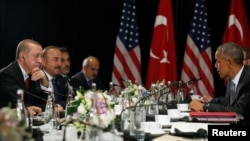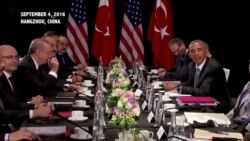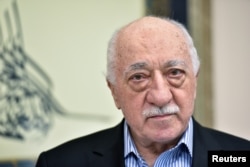U.S. President Barack Obama assured Turkish President Recep Tayyip Erdogan on Sunday that Washington is committed to bring the perpetrators of the failed July coup against his government to justice, but stopped short of saying the U.S. would extradite the Muslim cleric that Ankara blames.
"We will make sure that those who carried out these activities are brought to justice," Obama told the Turkish leader as they met on the sidelines of the G-20 summit in the Chinese city of Hangzhou.
WATCH: President Obama on failed coup in Turkey
Turkey contends that 75-year-old Fethullah Gulen, living in self-imposed exile since 1999 in the eastern U.S. state of Pennsylvania, orchestrated the putsch, although he adamantly has denied any involvement.
Turkey has pleaded with the U.S. to send Gulen back to Turkey, but American officials say that Ankara has yet to provide them with any evidence linking him to the failed plot to overthrow Erdogan's government, only information about his past activities. The U.S. says that any extradition attempt would have to be approved in the U.S. court system.
Obama on aborted coup
Obama, meeting with Erdogan for the first time face-to-face since the aborted coup, described it as "terrible."
"By taking to the streets to resist the coup attempt, the Turkish people once again affirmed their commitment to democracy and the strength and resilience of democratic institutions inside of Turkey," Obama said.
"I indicated at the time [of the coup attempt] the unequivocal condemnation of these actions and spoke personally to President Erdogan to offer any support that we might be able to provide in both ending the attempted coup, but also in investigating and bringing perpetrators of these illegal actions to justice," Obama said.
The Turkish leader said justice officials from the two countries would corroborate in their efforts hold the perpetrators accountable.
"The post attempted-coup documentation and evidence therein will be amassed and they will be submitted to our friends in the United States," Erdogan said. "The efforts are still under way. We had welcomed a delegation from the American Justice Department and a similar delegation from the Turkish Ministry of Justice will go to the United States. Our minister of justice and minister of interior will travel together to the United States whereby they will concentrate their efforts on the elaboration of this evidence."
Since July, Turkey has ousted 80,000 civil servants, teachers, judges and other workers believed to be Gulen sympathizers or somehow involved in the failed coup, arresting many of them.
Syria
Aside from the Gulen extradition request, tensions between Turkey and United States, two NATO allies, have been strained over the fight to oust Islamic State jihadists from Syrian strongholds south of the Turkish border.
While Washington and Ankara both have carried out the campaign against Islamic State fighters, Turkey also has bombed Kurdish positions, accusing the Syrian Kurds of being allied with the Kurdistan Workers Party, Kurdish fighters who have claimed responsibility for deadly attacks inside Turkey.
The U.S. considers the Syrian Kurds to be staunch fighters against Islamic State and has sought to curb Ankara's attacks on them.
Erdogan says there should be no distinction between "good terrorists" and bad ones.









